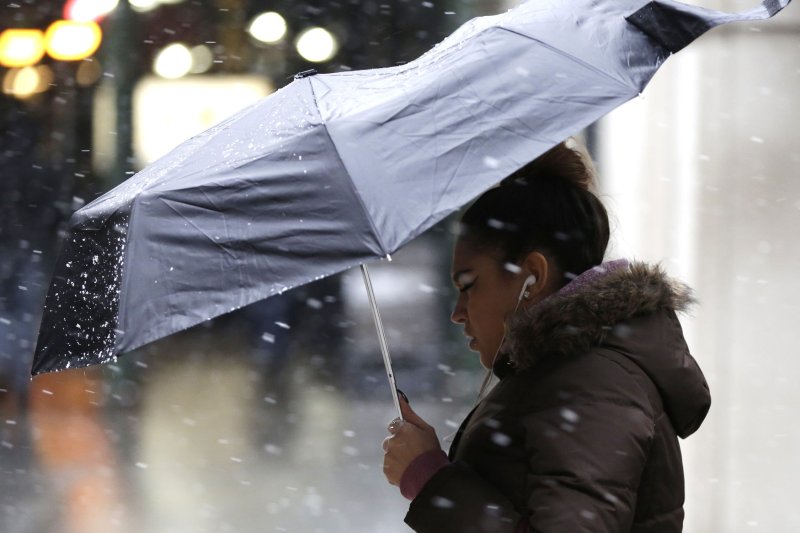New research suggests people are more likely to bring an umbrella if a weather forecast revises the chance of rain upward from 20 to 30 percent than if it revises it downward from 40 to 30 percent. Photo by John Angelillo/UPI |
License Photo
SCARBOROUGH, Ontario, June 23 (UPI) -- A new study suggests upward swings in probability make predictions feel more likely to human interpreters.
For example, a person is more apt to take an umbrella if a rain forecast is upgraded from a 20 to 30 percent chance of showers than if it is downgraded from 40 to 30 percent.
The new research, conducted by psychologists at the University of Toronto Scarborough, show people tend to expect trends to continue their up or down trajectory, thus an increasing probability makes a predicted event seem more likely.
"If the latest estimate is 30 percent, then it's equally likely to go up or down or stay flat, but we have a tendency to perceive momentum -- if things have gone up, we assume the trend will continue," Sam Maglio, an assistant professor of management at UTSC, said in a news release.
Maglio and his research partner Evan Polman explored the phenomenon by looking at past probability studies involving weather, climate change, sex, sports and wine quality. The pair found evidence of the influence of probability momentum in all of the studies.
"It all stems from a common belief that a revision in probability signals a trend, reflecting what is known as psychological momentum," Maglio explained. "It simply means that people often conclude that trends will continue in a given direction."
The new study shows the phenomenon of probability momentum doesn't just affect how people feel, but how they think and make decisions -- how they act.
In one study, people were offered a choice between two free bottles of wine. One bottle was less expensive, but study participants were told it had no risk of contamination. Participants were told second bottle of more expensive wine had a 15 percent chance of being corked, having the cork break and crumble into the wine.
Participants in the study were more likely to choose the more expensive bottle if the risk was revised down from 20 to 15 percent than if it was revised up from 10 to 15 percent.
Researchers say their findings have implications for marketers, economists and other behavioral psychologists.
"It's human nature to think and wonder about the future, and that bleeds into decisions being made in the present," Maglio said. "It's important to know that there's more to an event feeling riskier or more likely to happen than that event actually being riskier or more likely to happen."
The new study was published month in the Journal of Personality and Social Psychology.















